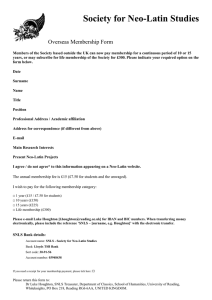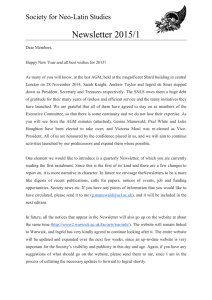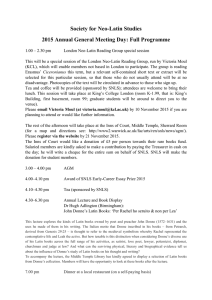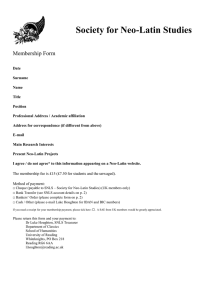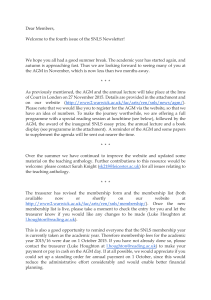Dear Members,
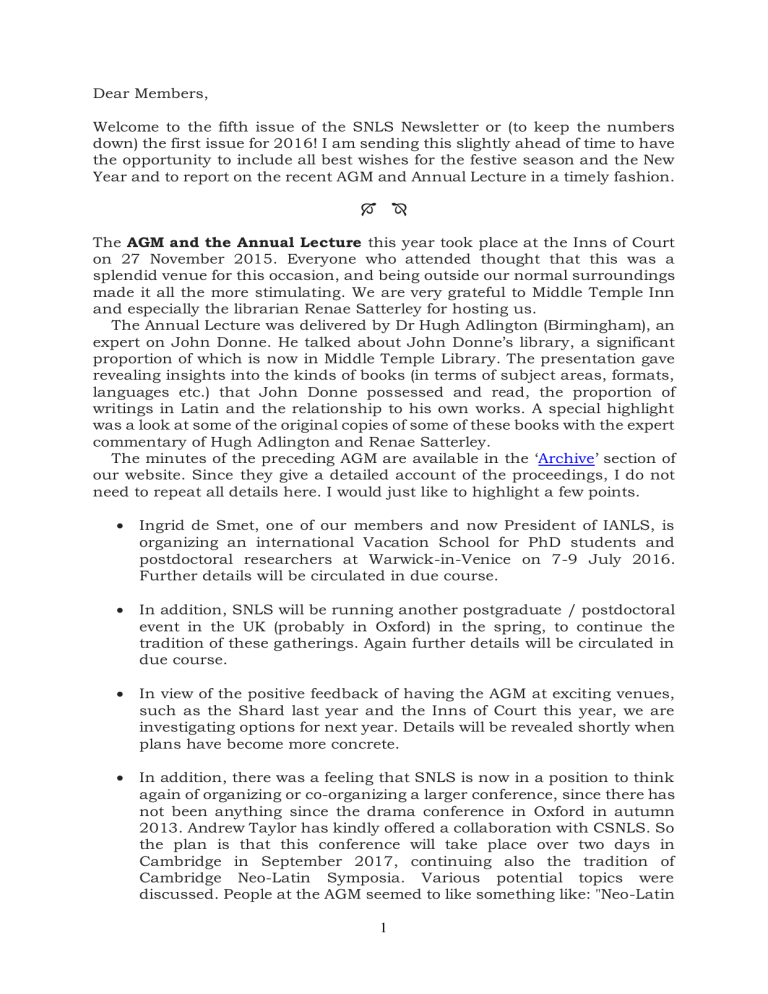
Dear Members,
Welcome to the fifth issue of the SNLS Newsletter or (to keep the numbers down) the first issue for 2016! I am sending this slightly ahead of time to have the opportunity to include all best wishes for the festive season and the New
Year and to report on the recent AGM and Annual Lecture in a timely fashion.
The AGM and the Annual Lecture this year took place at the Inns of Court on 27 November 2015. Everyone who attended thought that this was a splendid venue for this occasion, and being outside our normal surroundings made it all the more stimulating. We are very grateful to Middle Temple Inn and especially the librarian Renae Satterley for hosting us.
The Annual Lecture was delivered by Dr Hugh Adlington (Birmingham), an expert on John Donne. He talked about John Donne’s library, a significant proportion of which is now in Middle Temple Library. The presentation gave revealing insights into the kinds of books (in terms of subject areas, formats, languages etc.) that John Donne possessed and read, the proportion of writings in Latin and the relationship to his own works. A special highlight was a look at some of the original copies of some of these books with the expert commentary of Hugh Adlington and Renae Satterley.
The minutes of the preceding AGM are available in the ‘ Archive ’ section of our website. Since they give a detailed account of the proceedings, I do not need to repeat all details here. I would just like to highlight a few points.
Ingrid de Smet, one of our members and now President of IANLS, is organizing an international Vacation School for PhD students and postdoctoral researchers at Warwick-in-Venice on 7-9 July 2016.
Further details will be circulated in due course.
In addition, SNLS will be running another postgraduate / postdoctoral event in the UK (probably in Oxford) in the spring, to continue the tradition of these gatherings. Again further details will be circulated in due course.
In view of the positive feedback of having the AGM at exciting venues, such as the Shard last year and the Inns of Court this year, we are investigating options for next year. Details will be revealed shortly when plans have become more concrete.
In addition, there was a feeling that SNLS is now in a position to think again of organizing or co-organizing a larger conference, since there has not been anything since the drama conference in Oxford in autumn
2013. Andrew Taylor has kindly offered a collaboration with CSNLS. So the plan is that this conference will take place over two days in
Cambridge in September 2017, continuing also the tradition of
Cambridge Neo-Latin Symposia. Various potential topics were discussed. People at the AGM seemed to like something like: "Neo-Latin
1
and the World beyond Europe"; another options would be something on the Italian Renaissance. Before we are finalizing this, we would like to hear what other members think. If any views on this topic or suggestions for alternatives could be sent to me by 15 January 2016, this would be helpful. Then we can take this idea forward and look at practical aspects, funding applications etc. early in the New Year. We will keep you posted.
The inaugural SNLS Early-Career Essay Prize (2015) was awarded to
Bernhard Schirg (Freie Universität Berlin). His prize-winning essay entitled ‘The rebel residing in Cortese’s ideal palace. Splendor and magnificence in Cardinal Bernardino de Carvajal's (1456–1523) residence in the (lost) Palazzo Millini’ will be published in the Journal of the Courtauld and Warburg Institutes (see also note on the SNLS website).
The call for submissions for the next essay prize (with slightly revised rules) is already open:
Submissions for the SNLS Early-Career Essay Prize 2016 are now invited.
All PhD students and post-doctoral researchers up to two years after their viva and not yet in a permanent post by the deadline (who are SNLS members) are eligible to submit an essay of up to 7,000 words (e.g. part of a chapter or a draft of an article or a written version of a conference paper) by 1 September
2016 (as an email attachment to g.manuwald@ucl.ac.uk
). The word count includes footnotes, but excludes title, bibliography and any appendixes
(which, however, should not be longer than the text of the essay). The name of the author, their affiliation and their role (e.g. final-year PhD student) as well as the word count should be indicated on the title page. Candidates can enter in every year in which they are eligible, but they may not submit the same essay twice. SNLS is particularly looking for contributions discussing less well-known Neo-Latin texts and providing close reading of these and / or discussions of context at a high scholarly level in terms of both contents and presentation. All submissions will be judged by members of the Executive
Committee, who may ask other experts to join them. Candidates will be informed of the outcome by email within a month of the submission date. The winner will be announced officially at the AGM in November and will receive a certificate, a small financial award and publication advice if required.
In terms of SNLS housekeeping, it was decided to update the Statutes, mainly to have them reflect current practices. The new version will shortly be available on the website. Some parts of the website that we do not wish to be publicly available are password protected.
It was also agreed to raise the annual membership fee slightly (£15 standard membership). I hope this will not be too much of a shock and that you do not mind me reminding you that the SNLS membership year is the academic year and membership fees were due on 1 October 2015. So, if you
2
have not paid for this year or are unsure, please contact the treasurer Luke
Hougton ( l.houghton@reading.ac.uk
).
The Neo-Latin Reading Group held weekly at King’s College London (on the
Strand) will resume with a new text and a new meeting time in mid-January.
If you are interested, and would like to be notified of the arrangements, please email Victoria Moul ( victoria.moul@kcl.ac.uk
) to add your name to the mailing list. All are welcome, and no preparation is required. After reading
Erasmus’s Ciceronianus last term, we shall be returning to poetry or drama next term.
I attended a meeting of the Learned Societies and Subject Associations
Network at the British Academy on behalf of SNLS earlier this month. The meeting focused on issues to do with interdisciplinarity. Almost everyone agreed that interdisciplinarity was a good thing, but that it was often difficult to realize because of the structure of higher education institutions in the UK and standard career paths. The British Academy has a working group on interdisciplinarity and will look into this. It was interesting to note that SNLS is the only truly interdisciplinary society in this group since the others represent subjects (such as English, Linguistics, Political Science, History etc.).
News from the wider world of Neo-Latin and early modern studies:
A conference on "The Influence of Vernacular Discourses on Neo-Latin
Literature" will take place at the Ludwig Boltzmann Institute for Neo-Latin
Studies in Innsbruck (Austria) on 21-23 April 2016 (further details on the
SNLS website). The call for papers is just closing. Please contact Florian
Schaffenrath if you are interested
( florian.schaffenrath@neolatin.lbg.ac.at
).
The 18th NeoLatina symposium will be held in Freiburg (Germany) on 17-
18 June 2016. It will be dedicated to the topic of ‘Neo-Latin metre’. If you would like to contribute a paper, please take a look at the call for papers at https://www.altphil.uni-freiburg.de/termine/neolatina2016 .
A conference to mark the "Quincentenary of Rogar Ascham (1516–1568)" will take place at St John’s College Cambridge on 9-10 September 2016
(further details on the SNLS website). Abstracts (of c. 200 words) for papers (and any queries) should be emailed to rogerascham2016@gmail.com
no later than 15 May 2016.
Birkbeck Early Modern Society is pleased to announce its 9th annual student conference on the theme of ‘Sensing the Early Modern’ to take place on 20th February 2016. We invite proposals for papers that explore perceptions of the senses during the early modern period, 1500-1800 and we welcome proposals from post-graduate students from all institutions.
Conference papers might address the five traditional senses sight, hearing, taste, smell, and touch or those less defined areas, such as the sense of time or place; of common sense, pain or pleasure. Please submit
3
an abstract of no more than 250 words for a paper lasting 20-25 minutes
(about 2,000-2,500 words) to Sue Jones, President, Birkbeck Early
Modern Society, bbkems@gmail.com
by 5pm on 11th December 2015. The abstract should be in the Microsoft word document headed with your name, programme of study and institution.
British Milton Seminar: spring 2016 meeting.
Date: Saturday 12 March 2016. There will be two sessions, from 11.00 am to 12.30 pm, and from 2.00 pm to 4.00 pm.Venue: The Birmingham and
Midland Institute, Margaret Street, Birmingham.
The British Milton Seminar meets twice yearly to discuss papers on subjects relating to John Milton's life, work and times, together with his legacy and influence. The seminar is open to academic and academicrelated staff and to postgraduate students. We currently intend that each session will have two papers (of approx. 25-30 minutes each), for which proposals are invited.
Please send proposals
( h.c.adlington@bham.ac.uk
) and/or to Dr
Professor
Hugh
( sk218@le.ac.uk
) by no later than 15 January 2016.
Sarah
Adlington
Knight
UCL Renaissance Latin Reading Group, from Thursday 14 January 2016, at 5.00 p.m. in the UCL Italian Seminar Room, Foster Court
351.
http://www.ucl.ac.uk/mars/seminars-lectures/latin-reading .
Grants for library work available (deadline 31 December 2015): http://www.cilip.org.uk/library-information-history-group/james-ollawards
New book from one of our members:
Paul Gwynne, Patterns of Patronage in Renaissance Rome: Francesco
Sperulo: Poet, Prelate, Soldier, Spy, 2 vols, Peter Lang 2015
Published by Peter Lang, this critically acclaimed work is the first fulllength study of the life and works of Francesco Sperulo of Camerino (1463-
1531). In a remarkable career during which the poet progressed from serving as a soldier of fortune in the service of Cesare Borgia to an Italian bishopric, Sperulo produced a significant body of Latin poetry here presented in a critical edition for the first time. Patronized by popes and cardinals, an impressive array of contemporary figures such as Leonardo da Vinci, Isabella d’Este, Raphael and Baldassare Castiglione appear in his verse. By placing his work within the larger historical, literary, political and social context this study provides an invaluable window onto the role played by neo-Latin poetry at the papal court and documents the impact of classical culture in Rome during the period usually referred to as ‘the
High Renaissance’.
New book on very ‘Neo’-Latin:
Scaeva Press announces the publication of Poematia Moderna: Modern
Latin Poetry , over 300 poems written between 1900 and 2010 by sixtynine authors from seventeen nations, with a facing-page translation. The
4
criterion used was "short and sweet", making the text accessible to first- and second-year students. Modern topics range from 9/11 through skateboards and cell phones to the Big Bang. Joseph Tusiani, author of eight books of poetry and dean of living Latin poets writes, "What a great book this is! I am overwhelmed by the vastness of its material and the accuracy of its research. This is the most important anthology of modern
Latin poetry ever published. I did not know that so many Latin poets from so many nations existed." On the web at http://www.modernlatinpoetry.com
Some more recent http://culturaclasica.com/?q=palaestralatina
Neo-Latin:
Jeanne Shami is pleased to announce a database of early modern sermon manuscripts (1530-1715): GEMMS (Gateway to Early Modern Sermon
Manuscripts) the address http://www.gemmsproject.blogspot.com/ blogpost
That’s it in terms of Neo-Latin news for this year. Thank you for all your activities and contributions this year, and we look forward to more in the New
Year.
Best wishes,
Gesine Manuwald
(President, SNLS)
5
